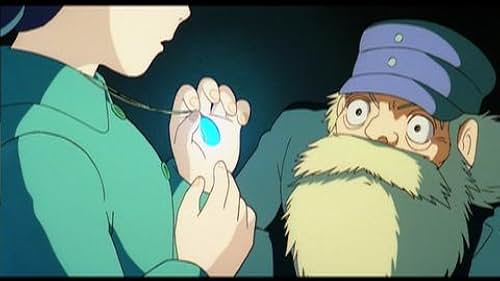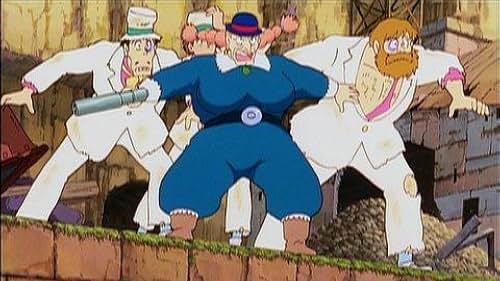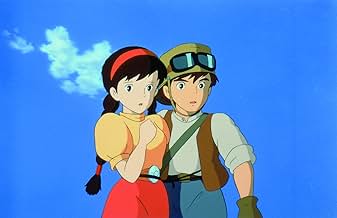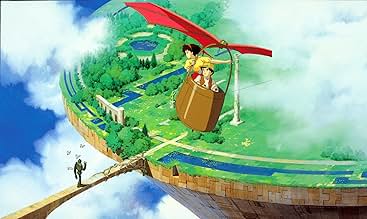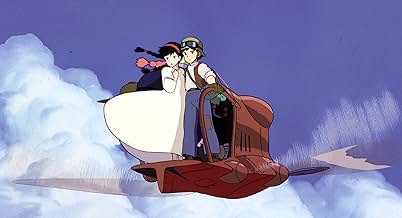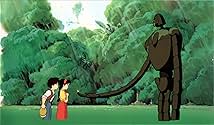Pazu's life changes when he meets Sheeta, a girl whom pirates are chasing for her crystal amulet, which has the potential to locate Laputa, a legendary castle floating in the sky.Pazu's life changes when he meets Sheeta, a girl whom pirates are chasing for her crystal amulet, which has the potential to locate Laputa, a legendary castle floating in the sky.Pazu's life changes when he meets Sheeta, a girl whom pirates are chasing for her crystal amulet, which has the potential to locate Laputa, a legendary castle floating in the sky.
- Awards
- 1 win
Mayumi Tanaka
- Pazu
- (voice)
Keiko Yokozawa
- Sheeta
- (voice)
Kotoe Hatsui
- Dola
- (voice)
Minori Terada
- Muska
- (voice)
Fujio Tokita
- Uncle Pom
- (voice)
Ichirô Nagai
- Shogun Mouro
- (voice)
Hiroshi Ito
- Oyakata
- (voice)
Machiko Washio
- Okami
- (voice)
Takuzô Kamiyama
- Shalulu
- (voice)
Yoshito Yasuhara
- Lui
- (voice)
Sukekiyo Kameyama
- Anli
- (voice)
Ryûji Saikachi
- Old Engineer
- (voice)
Takahiro Hirai
- Chinese minion
- (voice)
Shinya Ôtaki
- Egyptian minion
- (voice)
- (as Shinya Ohtaki)
Storyline
Did you know
- TriviaLaputa, the flying island, was a setting in Jonathan Swift's novel Gulliver's Travels, published in 1726. Hayao Miyazaki says in interviews that he was unaware that "la puta" means "the whore" in Spanish. If he had known the translation, he would not have used it as a title. Swift, incidentally, is considered the inventor of "black comedy" and, as a well-educated man and satirist, very likely knew the meaning of the Spanish term (in the novel, the Gulliver character lists Spanish as one of the many languages he's fluent in).
- GoofsIn the punchout scene between Shalulu and Pazu's boss, there are instances where we don't hear any auditory reactions, much less punches, when the camera is showing long shots of the crowd in either the Japanese version or the Magnum-English dub. (Disney's version, predictably, adds in more walla and punching sounds for that scene.)
- Quotes
Uncle Pomme: The earth speaks to all of us, and if we listen, we can understand.
- Crazy creditsThe end credits show the remains of the castle Laputa floating on Earth's orbit.
- Alternate versionsAn English dub of this film was produced by the Walt Disney Company in 1999 (originally intended to be released that same year), but wasn't released on DVD until 2003. The English dub shortens the title to "Castle in the Sky," removing the word "Laputa," since it means "the whore" in Spanish. The voice cast includes James Van Der Beek, Anna Paquin, Mark Hamill, Cloris Leachman, Mandy Patinkin, Andy Dick, and Michael McShane.
- ConnectionsEdited into Miyazaki Dreams of Flying (2017)
- SoundtracksKimi wo Nosete
(Carrying You)
(insert song)
Lyrics by Hayao Miyazaki
Music by Joe Hisaishi
Performed by Azumi Inoue (Tokuma Japan)
Featured review
Have you ever wished that you could escape your dull and stressful life at school or work and go on a magical adventure of your own, with one of your closest friends at your side, facing all sorts of dangers and villains, and unraveling the mystery of a lost civilization that's just waiting for someone to discover all its secrets? Even if you're not quite that much of a fantasy-lover, have you ever wished you could simply experience what it's like to be a kid again, and not have a care in the world, for just a couple of hours?
This is exactly what Miyazaki's "Castle in the Sky" is all about. Pazu, a young but very brave and ambitious engineer, lives a rustic life in a mining town until one day, a girl named Sheeta falls down from the sky like an angel and takes him on a journey to a place far beyond the clouds, while all the while they have pirates and military units hot on their trail. Simply put, it is just the incredible adventure that every kid dreams of at one point or another, and I can't help but feel my worries melt away every time I see it.
As it is one of Miyazaki's older works and takes much place in the everyday world, the film is not as visually spectacular or deep in its storyline as Spirited Away, Howl's Moving Castle, or even Princess Mononoke. Still, I find it difficult to say that any of these films are superior over the other, because all three of those films are, at some point or another, mystical to the point of being enigmatic, if not perplexing, especially for the youngest of viewers.
"Castle in the Sky", on the other hand, doesn't try so much to be an allegory of any kind, and it's not a coming-of-age story either; it is instead quite possibly one of the best depictions of the inside of a child's mind I've ever seen. Not only is the artwork beautiful, but the use of perspective from the kids' eyes is just amazing; whether it's the panning up of the "camera" to see the enormous trees or clouds overhead, or the incredible sense of height from looking down at the ground or ocean while hundreds of feet in the air, I just can't help but FEEL like I'm there with Pazu and Sheeta, just a kid in another world, far far away from reality.
Even the kids themselves don't have a complex relationship that suggests a need for hope like Ashitaka/San or Chihiro/Haku; Sheeta is Pazu's angel, having literally fallen into his life from the sky one day, the absolutely perfect person for him right from the very start. As the film progresses, more and more of their true adventurous childhood spirit comes out through their kind words and beautifully realistic facial expressions. Not only are they an adorable reminder of who I used to be, but their endearing friendship never lets up throughout the whole film, only growing stronger all the way to the last frame. For that reason, I've fallen in love with the two of them more than I have with any other Miyazaki couple.
At the same time, "Castle in the Sky" is such an easily accessible film because no matter what kind of casual moviegoer you may be, you'll be sure to find your fix here. Mystery, action, drama, comedy, suspense, sci-fi, romance, even some western...it's all here, just about everything people go to the movies for (except maybe horror). This why I can easily recommend it as a first Miyazaki film; it's perfect for those who have no expectations from having already seen the incredible otherworldliness of some of his more recent works.
Even the ending song of the film, when translated into English, conveys the sense of longing for the discovery of some kind of lost civilization, and some kind of soul-mate, that could not be found in our mundane lives. "The reason I long for the many lights is that you are there in one of them...The earth spins, carrying you, carrying us both who'll surely meet." Miyazaki has always provided poetic lyrics to make ending songs out of Joe Hiasashi's gorgeous scores, but this is the only one I've seen that's both a touching love song and an inspirational dream. I have found myself near tears just listening to it.
"Castle in the Sky" may not be Miyazaki's most developed, spectacular, or meaningful work, but it's absolutely perfect for what it really was meant to be: a true vision of childhood fantasy, and a wonderful escape from reality for any adults who wish they could have the same wonderful sense of imagination they had when they were just carefree little kids. Sit back, relax, and love it for what it is.
This is exactly what Miyazaki's "Castle in the Sky" is all about. Pazu, a young but very brave and ambitious engineer, lives a rustic life in a mining town until one day, a girl named Sheeta falls down from the sky like an angel and takes him on a journey to a place far beyond the clouds, while all the while they have pirates and military units hot on their trail. Simply put, it is just the incredible adventure that every kid dreams of at one point or another, and I can't help but feel my worries melt away every time I see it.
As it is one of Miyazaki's older works and takes much place in the everyday world, the film is not as visually spectacular or deep in its storyline as Spirited Away, Howl's Moving Castle, or even Princess Mononoke. Still, I find it difficult to say that any of these films are superior over the other, because all three of those films are, at some point or another, mystical to the point of being enigmatic, if not perplexing, especially for the youngest of viewers.
"Castle in the Sky", on the other hand, doesn't try so much to be an allegory of any kind, and it's not a coming-of-age story either; it is instead quite possibly one of the best depictions of the inside of a child's mind I've ever seen. Not only is the artwork beautiful, but the use of perspective from the kids' eyes is just amazing; whether it's the panning up of the "camera" to see the enormous trees or clouds overhead, or the incredible sense of height from looking down at the ground or ocean while hundreds of feet in the air, I just can't help but FEEL like I'm there with Pazu and Sheeta, just a kid in another world, far far away from reality.
Even the kids themselves don't have a complex relationship that suggests a need for hope like Ashitaka/San or Chihiro/Haku; Sheeta is Pazu's angel, having literally fallen into his life from the sky one day, the absolutely perfect person for him right from the very start. As the film progresses, more and more of their true adventurous childhood spirit comes out through their kind words and beautifully realistic facial expressions. Not only are they an adorable reminder of who I used to be, but their endearing friendship never lets up throughout the whole film, only growing stronger all the way to the last frame. For that reason, I've fallen in love with the two of them more than I have with any other Miyazaki couple.
At the same time, "Castle in the Sky" is such an easily accessible film because no matter what kind of casual moviegoer you may be, you'll be sure to find your fix here. Mystery, action, drama, comedy, suspense, sci-fi, romance, even some western...it's all here, just about everything people go to the movies for (except maybe horror). This why I can easily recommend it as a first Miyazaki film; it's perfect for those who have no expectations from having already seen the incredible otherworldliness of some of his more recent works.
Even the ending song of the film, when translated into English, conveys the sense of longing for the discovery of some kind of lost civilization, and some kind of soul-mate, that could not be found in our mundane lives. "The reason I long for the many lights is that you are there in one of them...The earth spins, carrying you, carrying us both who'll surely meet." Miyazaki has always provided poetic lyrics to make ending songs out of Joe Hiasashi's gorgeous scores, but this is the only one I've seen that's both a touching love song and an inspirational dream. I have found myself near tears just listening to it.
"Castle in the Sky" may not be Miyazaki's most developed, spectacular, or meaningful work, but it's absolutely perfect for what it really was meant to be: a true vision of childhood fantasy, and a wonderful escape from reality for any adults who wish they could have the same wonderful sense of imagination they had when they were just carefree little kids. Sit back, relax, and love it for what it is.
- CsikosPost
- Oct 4, 2006
- Permalink
Details
- Release date
- Country of origin
- Official site
- Language
- Also known as
- Laputa
- Production companies
- See more company credits at IMDbPro
Box office
- Budget
- $3,300,000 (estimated)
- Gross US & Canada
- $523,664
- Opening weekend US & Canada
- $197,172
- Nov 18, 2018
- Gross worldwide
- $6,218,229
- Runtime2 hours 4 minutes
- Color
- Sound mix
- Aspect ratio
- 1.85 : 1
Contribute to this page
Suggest an edit or add missing content




